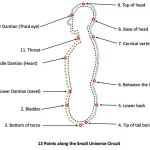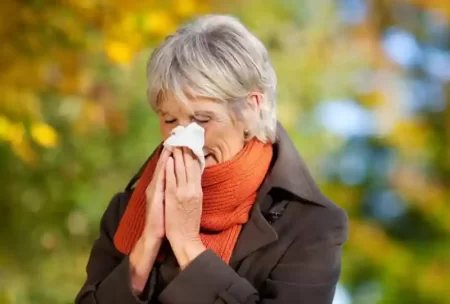
Small Universe Qigong Meditation
10 May 2022
Basic Qigong theories
30 May 2023Acupuncture as a Recommended Alternative Treatment for Hay Fever or Allergic Rhinitis

Peak season for hay fever in Melbourne is typically around September to December. Never underestimate hay fever as it affects 1 in 5 people in Australia. [1]
Hay fever is the common name for allergic rhinitis. It is a reaction that occurs when your nose or eyes come in contact with allergens to which you are sensitive, such as pollens, dust mites, moulds or animal dander. For some people, exposure to these allergens can trigger an immune response, which leads to swelling and inflammation in the inner lining of the nose. [1]
Although hay fever is not a serious illness, it is clinically relevant because it underlies many complications. It is a major risk factor for poor asthma control, and affects quality of life and productivity at work or school. [2] Up to four out of five people with asthma also have allergies like hay fever—either at certain times of the year or all year round. [3]
Symptoms
Common symptoms of hay fever include [1]:
- an itchy, runny or blocked nose
- itchy or watery eyes
- frequent sneezing
- needing to breathe from the mouth
- always needing to clear your throat
- always feeling like you have a head cold
- snoring during sleep
Less common symptoms of hay fever may include:
- interrupted sleep
- feeling tired during the day
- difficulty concentrating
- frequent headaches
- recurring sore throats
- a hoarse voice
- facial pain or pressure
- a reduced sense of smell
- frequent sinus infections in adults
- recurring ear infections (otitis) in children
You might only experience some of these symptoms, but still have hay fever. Some of these symptoms can be caused by other diseases too.
How Acupuncture Can Help
Before we consider how to deal with this recurring and annoying disease, we should know a key point: hay fever is an immune response triggered by allergens. [1] Despite our immune system being designed to protect our bodies from outside invaders, it has the habit of reacting excessively under pressure. [4] When a combination of fatigue, illnesses, medications, overwork, etc, leaves our immune system struggling, it has little strength left to fight off the allergens.
Typically, symptom-reducing drugs are prescribed for hay fever, but these drugs may not be suitable for everyone. So, what is an alternative treatment for Hay Fever or allergic Rhinitis? Acupuncture! Acupuncture, one of the oldest and most commonly used systems of healing in the world, employs a holistic approach. The characteristic that acupuncture enhances resistance is closely related with the immune system, which functions in defence, balance, and surveillance. [5] So, more and more people pick acupuncture as their hay fever solution, as it does not only target the symptoms, but also strengthens the immune system and their lungs.
Effects of Acupuncture Demonstrated
As early as 2002 World Health Organization stated that acupuncture has been proved, through controlled trials, to be an effective treatment for a number of diseases including hay fever. [6] More and more research has revealed that acupuncture can regulate immunity and exert anti-inflammation effects. [5]
In a randomised controlled trial, subjects receiving the real acupuncture treatment had a significant improvement in both nasal symptoms (sneezing, watery rhinorrhoea, nasal congestion and itching nose) and non-nasal symptoms (itching eyes and eye watering) compared to the sham treatment group. The effect is not associated with any side effects. [7]
The above findings are echoed by numerous studies. The results of a systematic review show that, comparing to control group, acupuncture treatment group exerted a significant reduction in nasal symptoms. Questionnaire analysis also points to the efficacy of acupuncture treatment in improving quality of life in patients. [8]
Your Acupuncture consultation
If you have any questions on acupuncture as an alternative treatment for Hay Fever or allergic Rhinitis, please contact us by phone (0422 321 052) or by email (info@ahnh.com.au). Alternatively, you can book an appointment online by clicking here.
Reference
- Healthdirect Australia. (2020). Hay fever (allergic rhinitis). https://www.healthdirect.gov.au/hay-fever
- Greiner, A. N., Hellings, P. W., Rotiroti, G. & Scadding, G. K. (2011). Allergic rhinitis. The Lancet, 378(9809), 2112–2122. https://doi.org/10.1016/S0140-6736(11)60130-X
- National Asthma Council Australia. (2022). Pollen—a trigger for hay fever. Retrieved 24 October 2022, from https://www.nationalasthma.org.au/living-with-asthma/resources/patients-carers/factsheets/pollen-a-trigger-for-hay-fever
- Morey, J. N., Boggero, I. A., Scott, A. B., and Segerstrom, S. C. (2015). Current directions in stress and human immune function. Current Opinion in Psychology, 5(1), 13–17. https://doi.org/10.1016/j.copsyc.2015.03.007
- Liang, F.-X., Cooper, E. L., Wang, H., Jing, X.-H., Quispe-Cabanillas, J. G. & & Kondo, T. (2015). Acupuncture and immunity. Evidence-based Complementary and Alternative Medicine, 2015, 260620. https://doi.org/10.1155/2015/260620
- World Health Organization. (2002). Acupuncture: Review and Analysis of Reports on Controlled Clinical Trials. (P. 23, 29, 30)
- Xue, C. C., English, R., Zhang, J. J., Da Costa, C. & Li, C. G. (2002). Effect of acupuncture in the treatment of seasonal allergic rhinitis: A randomized controlled clinical trial. The American Journal of Chinese Medicine, 30(1), 1–11. (2002)https://doi.org/10.1142/S0192415X0200020X
- Feng, S.-Y., Han, M.-M., Fan, Y.-P., Yan, G.-W., Liao, Z.-P., Liao, W. & Li, H. B. (2015). Acupuncture for the treatment of allergic rhinitis: A systematic review and meta-analysis. American Journal of Rhinology & Allergy, 29(1). https://doi.org/10.2500/ajra.2015.29.4116

